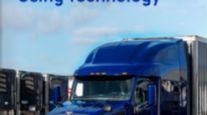iTECH: Fleets Boost Spending on Technology Upgrades
This article appears in the October/November 2011 issue of iTECH, published in the Oct. 10 print edition of Transport Topics. Click here to subscribe today.
With freight and revenue rebounding, some motor carrier executives are dusting off their checkbooks and making significant information technology purchases, fleet and technology company officials have said.
“Since the economic downturn in 2008, I have not spent much money, but I am definitely doing some spending on technology this year,” said Robert Ragan, senior vice president of finance at Tulsa, Okla., flatbed carrier Melton Truck Lines Inc.
Ragan said his company is buying several new T660 tractors from Kenworth Truck Co. and is spending $600,000 to outfit them with MCP200 in-cab computers made by San Diego-based Qualcomm Inc.
While during the recent recession smaller fleets put off making technology purchases, now they are making the investments they need, said Brian McLaughlin, chief operating officer for PeopleNet Communications Corp., the Minnetonka, Minn., provider of motor carrier onboard computing and mobile communications systems.
“I think what we’re seeing is more freight moving and revenue starting to come back,” McLaughlin said.
Adam Kahn, product marketing director of Qualcomm’s Enterprise Services division, said he believes that increased access to data, high fuel prices and hedging against the questionable economy are all factors that have compelled an uptick in business for his company.
“Over the past 24 months, Qualcomm has seen tremendous IT spending from both our existing customers and traditional late-adopters within the trucking industry,” Kahn said.
Monica Truelsch, a spokeswoman for software maker TMW Systems, Beachwood, Ohio, agreed.
“We are definitely seeing an increase in user and asset-based licenses from our existing customer base that indicates they are growing and adding trucks, activating drivers,” she said. “There is definitely expansion in capacity going on in our existing customer base.”
That growth has produced a corresponding increase in demand for trailer tracking, said Craig Montgomery, senior vice president of marketing for SkyBitz Inc., a Sterling, Va., supplier of devices to track truck trailers, intermodal containers and railcars.
“The dominant conversation right now is capacity, capacity, capacity,” he said. “Fleets are trying to increase operating efficiencies by increasing revenue loads per trailer, reducing turn cycle times and ensuring optimal operating conditions and yard management.”
Customers at TMW are purchasing technology for similar “tactical reasons,” Truelsch said.
“We are seeing across-the-board investments in business intelligence to help fleet managers understand their costs and what drives the business,” she said. “They are managing more trucks in action these days. So, if they had sidelined vehicles during the recession, they’re putting them back in play, or perhaps they have made acquisitions during the downturn, or they went out and bought new trucks and [are adding devices] that are related to increased [technology] sales,” she said.
Craig Fiander, vice president of marketing for ALK Technologies Inc., the Princeton, N.J., maker of mileage and navigation software, also has seen a shift as companies emerge from the economic downturn.
“If you look at 2010 as a milestone year for software and systems purchases, then 2011 seems to be an extension of that,” he said.
“The purse strings seem to be loosening up,” said Mark Coppock, marketing communications manager at Cheetah Software Systems Inc. Cheetah is a Westlake Village, Calif., supplier of logistics and dispatch software for less-than-truckload, courier and private fleets. “This may be in an effort to increase efficiency and productivity while they have the resources to make the required investments,” he said.
These executives’ comments dovetail with London-based research firm eyefortransport’s 2011 TruckIT report, which said 34% of fleet operators were making IT purchases to improve customer service, while 32% want to replace outdated technology and 31% want to improve safety.
The survey also said that this year, 46% of fleet operators reported an increase in their budgets, 42% saw no change and 12% indicated their budgets will decrease. Those results compare with 41%, 40% and 19%, respectively, in 2010; and 28%, 25% and 47%, respectively, in 2009.
The study concluded that 2011 budget increases mean new and worthwhile technologies continue to be available in which to invest, but also a growing need for improved fleet management, particularly with rising costs, a driver shortage and a cutback in trucking capacity during the recession.
This is why several IT products manufacturers said they’ve noticed a surge in sales and interest, particularly in software and devices that boost routing or fuel efficiency, simplify document imaging and help drivers comply with hours-of-service rules.
That range of features compelled Terry Croslow, chief operating officer of Bestway Express Inc., a Vincennes, Ind., dry van and refrigerated hauler, to make a significant technology investment this year.
“We will spend a little over a half-million dollars replacing [our current] units and putting PeopleNet mobile communication devices in our tractors,” he said. “We’re focusing on electronic logging for our drivers, on engine data to improve fuel economy and to reduce out-of-route miles and idling.
“We plan to use real-time information about what is happening under the hood to do some predictive modeling for maintenance purposes,” Croslow said. “We’re adding in-cab scanning to improve billing procedures for those shippers who still require proof of delivery and to get us closer to a paperless operation.”
The innovations in IT that make this kind of data accessible also help fleets justify the investment, said Mark Cubine, vice president of marketing at Birmingham, Ala.-based McLeod Software Inc.
“Most [truckers] receive the full return on their investment in a year or less,” Cubine said, adding that it’s easy for truckers to invest in IT to drive process improvement and operating efficiency because they can receive quick, tangible paybacks. Plus, he said, trucking companies no longer have to maintain an in-house staff of technology professionals.
“The [return on investment] is the key component when evaluating IT budget expenditures,” said Lynette Brown, chief financial officer at Pomona, Calif., truckload hauler KKW Trucking Inc. “We try to achieve an ROI of 18 months or better.”
Third-party logistics providers and shippers also are adding technology to help make their entire supply chains visible and more manageable. For example, United Vision Logistics, a 3PL based in Lafayette, La., has joined the buying spree.
“We are budgeted to spend 15% of our operating and capital budget on IT in 2011,” said Cheryl Pieper, UVL’s chief information officer. “Now more than ever, information on demand is critical to make real-time, fact-based decisions.”
She also said, “If you include all aspects of IT, we will most likely spend in excess of $100,000 supporting our current IT infrastructure for our operations.”
UVL also is upgrading its in-cab communications and GPS trailer-tracking units, Pieper said. “This IT expenditure will likely exceed half a million dollars over the next several years.”




